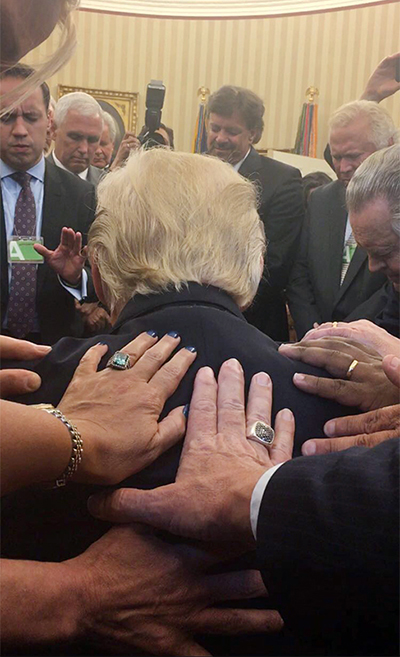Nashville Statement counters ‘agree-to-disagree’ sexuality
NASHVILLE (BP)—A coalition of conservative evangelicals, including about 70 Southern Baptists, issued a statement on biblical sexuality countering the idea that Christians “should agree to disagree” in their views of homosexual practice and transgenderism.
The Council on Biblical Manhood and Womanhood announced the release of The Nashville Statement, which consists of 14 affirmations and denials consistent with the church’s traditional teaching on human sexuality.
Not a matter of ‘moral indifference’
“We affirm that it is sinful to approve of homosexual immorality or transgenderism and that such approval constitutes an essential departure from Christian faithfulness and witness,” the statement says in part. “We deny that the approval of homosexual immorality or transgenderism is a matter of moral indifference about which otherwise faithful Christians should agree to disagree.”
The statement arrives at a time when some Christians, including some who identify as evangelicals, have revised their views on human sexuality, particularly by affirming same-sex relationships and marriage.
Others have asserted the issues are not essential to the Christian faith and evangelicals should be able to disagree on homosexuality and transgenderism without breaking fellowship.
The statement gained its name from a meeting the Council on Biblical Manhood and Womanhood convened in Nashville at which a coalition of scholars, pastors and other evangelical leaders discussed and endorsed the document. The Southern Baptist Ethics & Religious Liberty Commission hosted the meeting during its national conference and in conjunction with its research institute meeting.
Nashville Mayor Megan Barry, however, took exception to the name and the content of The Nashville Statement, tweeting: “The @CBMWorg’s so-called ‘Nashville Statement’ is poorly named and does not represent the inclusive values of the city & people of Nashville.”
In “the hope of serving Christ’s church,” the statement includes these declarations:
- God designed marriage as a covenantal union of only a man and a woman that is the sole context for sexual intercourse.
- God created male and female as equals but with differences intended for human flourishing.
- Adoption of “a homosexual or transgender self-conception” is inconsistent with God’s purposes.
- Same-sex attraction is not part of God’s original design, but people who experience such attraction may live fruitful lives through faith in Christ as they practice purity.
- God graciously empowers sinners “to forsake transgender self-conceptions” and “accept the God-ordained link between one’s biological sex and one’s self-conception as male or female.”
- People born with a sex development disorder possess the same “dignity and worth” as all other image-bearers of God.
‘Declare the goodness of God’s design’
Denny Burk, president of the Council on Biblical Manhood and Womanhood, said the statement’s aim “is to shine a light into the darkness—to declare the goodness of God’s design in our sexuality and in creating us as male and female.”
The coalition hopes to “provide help for churches and Christian organizations that are looking for biblical guidance on how to address homosexuality and transgenderism,” said Burk, also professor of biblical studies at Boyce College, the undergraduate school of Southern Baptist Theological Seminary in Louisville, Ky.
It also seeks to build a group of “like-minded evangelicals to stand together for the challenging days ahead” and to encourage young evangelicals who are under pressure to desert biblical teaching, he said.
Steve Gaines, president of the Southern Baptist Convention and pastor of Memphis-area Bellevue Baptist Church, decried “confusion in American culture regarding sexuality.”
“Yet the sacred Scriptures have not changed, nor will they,” Gaines said. “A faithful reading of the Bible shows that God’s standard regarding sexuality in general and marriage in particular is between one man and one woman for life. The Nashville Statement affirms that biblical viewpoint clearly and graciously. I am glad to endorse this wonderful statement of biblical truth.”
‘Urgently needed’
ERLC President Russell Moore described the statement as “an urgently needed moment of gospel clarity.”
“The Sexual Revolution cannot keep its promises, and the church must stand ready to receive with compassion the many who are in need of a better hope. The Nashville Statement is part of that mission, and my prayer is that it will help anchor churches and Christians to the gospel of Jesus Christ for years to come,” Moore said.
Among the initial signers of the document are British theologian J.I. Packer; theologian Wayne Grudem; author John Piper; pastors John MacArthur and Alistair Begg; family leaders James Dobson, Tony Perkins and Dennis Rainey; theologians R.C. Sproul and D.A. Carson; and authors Rosaria Butterfield and Sam Allberry.
The lengthy list of Southern Baptist signers includes:
- Former SBC presidents Ronnie Floyd, Jack Graham, Johnny Hunt, Fred Luter, James Merritt, Frank S. Page, Paige Patterson and Bryant Wright.
- All six SBC seminary presidents—Jeff Iorg of Gateway; Jason Allen of Midwestern; Chuck Kelley of New Orleans; Danny Akin of Southeastern Seminary; Al Mohler of Southern; and Patterson of Southwestern.
- SBC entity heads—Moore of the ERLC, Kevin Ezell of the North American Mission Board, O.S. Hawkins of GuideStone Financial Resources, Thom Rainer of LifeWay Christian Resources and Frank S. Page of the Executive Committee.
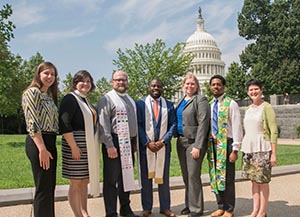

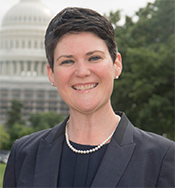

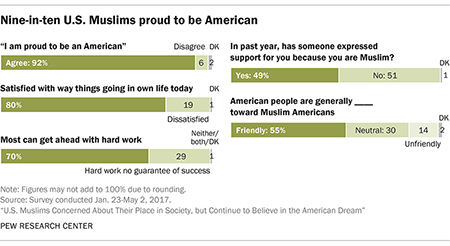 But even more Muslims—89 percent—say they are proud to be both American and Muslim. A significant majority also profess a continuing faith in the American dream.
But even more Muslims—89 percent—say they are proud to be both American and Muslim. A significant majority also profess a continuing faith in the American dream.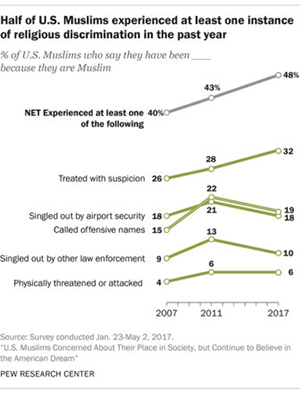 But even as Muslims have a growing sense of American support, they report increasing instances of religious discrimination in the past year—from being treated with suspicion to physical attacks. Almost half—48 percent—say that was their experience, compared to 43 percent in 2011 and 40 percent in 2007.
But even as Muslims have a growing sense of American support, they report increasing instances of religious discrimination in the past year—from being treated with suspicion to physical attacks. Almost half—48 percent—say that was their experience, compared to 43 percent in 2011 and 40 percent in 2007.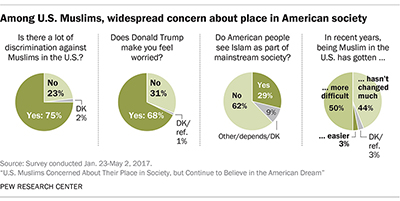 Overall, the majority of Muslims surveyed disapprove of Trump’s job performance, but President George W. Bush received similar levels of disapproval 10 years ago during his second term. While 65 percent of U.S. Muslims disapprove of Trump in the 2017 survey, 69 percent disapproved of Bush in 2007. In contrast, 14 percent disapproved of President Obama in 2011.
Overall, the majority of Muslims surveyed disapprove of Trump’s job performance, but President George W. Bush received similar levels of disapproval 10 years ago during his second term. While 65 percent of U.S. Muslims disapprove of Trump in the 2017 survey, 69 percent disapproved of Bush in 2007. In contrast, 14 percent disapproved of President Obama in 2011.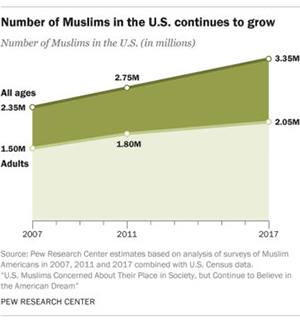 Researchers report a growing U.S. Muslim population—increasing from an estimated 2.35 million in 2007 to 3.35 million people of all ages today—with almost six in 10 born outside the U.S. The vast majority of Muslims living in the U.S. (82 percent) are American citizens.
Researchers report a growing U.S. Muslim population—increasing from an estimated 2.35 million in 2007 to 3.35 million people of all ages today—with almost six in 10 born outside the U.S. The vast majority of Muslims living in the U.S. (82 percent) are American citizens.